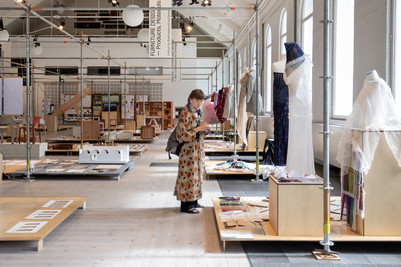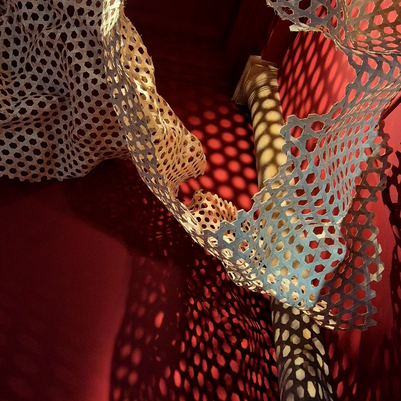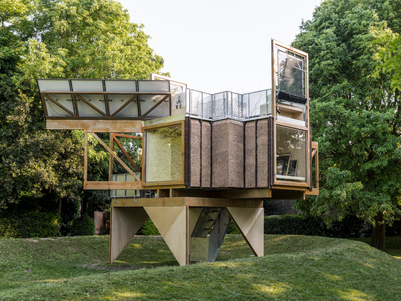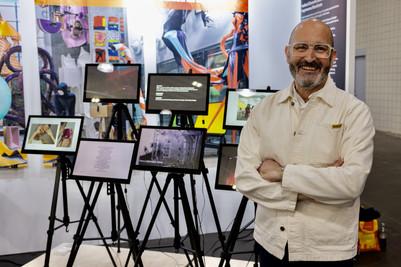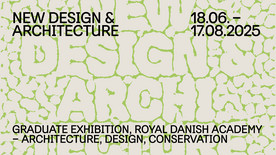
About the programme
The programme is part of the 2-year Master's programme at the school of Architecture. Read more about the programme's academic content and structure here.
Programme description
Programme description
The conditions and practices of the built environment are impacted in a range of ways by emerging conditions of polycrisis – including the climate emergency, breached planetary boundaries, declining biodiversity, rising socio-economic inequalities, shifting demographics, and threats to democracy. These fundamentally challenge the practices of “business as usual”. In this context, the ability of architects to identify and understand the evolving conditions impacting the field, and to envision optimistic and generous alternatives for our collective future, is increasingly crucial.
In response, the programme emphasizes research-based teaching. Students are guided to develop knowledge and proposals related to specific contexts, thematic conditions, functions, and pressing societal and environmental issues.
Alongside foundational knowledge in architectural, urban design, and strategic urban planning methods, as well as form-giving, systemic thinking, and representational techniques, students in the programme gain skills in theory, history, research methods, rhetorical strategies, and spatial visioning. This broad toolkit is intended to equip students to create innovative spatial responses to the complex challenges posed by the evolving polycrisis.
Subjects and Content
Subjects and Content
'Urbanism & Societal Change' is an important part of the Institute of Architecture, Urbanism & Landscape. The programmes at the Institute sometimes share a geographical frame or a common meta-theme during a semester. Through this approach, students are able to exploit and investigate different sets of professional positions, methods and knowledge-bases at the Institute, and the types of problematics that they entail.
The students within the programme are comprised of a mix of local Danish/Nordic students who have graduated from the Academy's own bachelor programmes; and international students who have graduated with bachelors in architecture from other institutions.
The studio space of the programme is the core educational environment in which an intensive, explorative and playful culture of collective learning and experimentation is fostered. Students of the programme are expected to work consistently in the studio space, with regular structured studio teaching days, along with lecture/workshop/reading seminar/course inputs on additional days.
A characteristic of the programme is that each semester’s project work is framed less according to conventional scalar categories, and more based on thematic approaches to the spatial aspects of critical societal and environmental changes. The themes offer a range of entry points into architectural, urban and spatial planning proposals that might range in scale from that of a building, to that of an urban space or a wider territory. Past thematics have included: socio-spatial segregation within disadvantaged neighbourhoods and housing areas; spatial imaginaries of climate adaptation in coastal zones; the urban and spatial implications of demographic aging; alternate spatial imaginaries for a restructured food system; urban spatial imaginaries of radical urban
Structure
Structure
The structure of the two-year program unfolds over four semesters:
Semester one is focused on developing broad knowledge, experience and competencies in program-specific methods and approaches to research and design. Project work is typically based in a Copenhagen or Danish context, exploiting local knowledge and local networks of collaborators including academics, practitioners, municipalities and key stakeholders. Students in the first and second year of the programme work together in this semester, typically working in groups of two or three students.
The second semester typically focuses on addressing a foreign context undergoing dynamic transformation, to which the studio conducts an in-depth study tour. These settings are intended both as less familiar environments to challenge students, and to allow them to reflect on conditions in their own ‘home’ contexts. Previous second semester sites have included Helsinki, Riga and Beijing – and have involved expanded activities such as on-site exhibitions and exchanges. In this semester, students in the first year of the programme work separately from second year students who are completing their thesis project. The semester starts with a cross-disciplinary, case-based course, LFB, which is an introduction to the theories and practices of spatial, urban planning. The course also offers introduction to some of the thematics of the main studio design assignment which is the focus of the last two-thirds of the semester. It is also possible for students to conduct a study exchange abroad during the second semester.
The third semester returns to the local context with the studio, mixed between students in the first and second year of the programme. In the third semester, students split their time between the (20 ECTS) studio project set in the Danish context, and a (10 ECTS) independent research thesis. The research project addresses the spatial implications of societal and environmental changes in a specific context of the student’s choice and is intended to form the basis of the student’s diploma thesis programme in the fourth semester. After the first three semesters of the programme, students will have had experience working across scales and modalities of design: from architectural design interventions, to urban design or neighbourhood designs, to local planning and spatial strategic planning.
The fourth and final semester is dedicated to developing the diploma thesis project on a societal and environmental change, context and programme of the student’s selection. Students are expected to deliver a mature, provocative, and thoroughly iterated research, programme and architectural and/or urban spatial proposition at the end of their studies.
Overall, the programme and the institute aims at training graduates who can take on leadership roles in the complex processes of urban transformation. Therefore, there is a focus on developing knowledge, experiences and competencies in terms of what this implies, both at the bachelor level and on the candidate programmes.
Courses
Courses
Courses specific to 'Urbanism & Societal Change'
Specific courses and workshops are planned for each semester and cover a range of areas and include:
- Theory seminars (previous seminars include: Extra Statecraft with Keller Easterling; Decolonizing Architecture with Sandi Hilal);
- Experimental and explorative workshops in architectural and urban design and representational formats (previous workshops include: Mapping and Design with Joost Grootens; The Visualisation with Philipp Schaerer/Filip duJardin: Video Narratives with Christopher Roth; Diagrams as Proposal Bridges with Archie Cantwell; Model Visions with Lauge Floris Larsen; Rendering Experiments with Forbes Massey; The Slide Deck with Nicolay Boyadjiev);
- Technology or application-specific courses such as: GIS: basic and advanced skills; Revit; Rendering and Visualization Pathways, etc.;
- Monday and Friday Inputs including curated lectures/workshops/reading seminars (previous inputs have included: Systemic Design with Marco Steinberg; The Boring Revolution with Indy Johar; The Moratorium with Charlotte Malterre-Barthes.)
Shared Courses at the Institute
Together with the students from the Institute’s other candidate-programme, students from Urbanism & Societal Change participate in a series of courses including:
- Spatial Planning – an introduction to the history, theory and practices of landscape architecture, urban planning, and urban development in Denmark and internationally
- LFB (Læreanstalternes Fælles Byplankursus)/Shared Urban Planning Course – an interdisciplinary, case-based urban planning course focused on analysis of cities and specific urban situations, and at the same time addressing the relationship between urban development and global challenges such as climate change, biodiversity loss, and social segregation. The course promotes cross-disciplinary approaches to urban planning and related fields.
Language
Language
The programme is taught in English.




